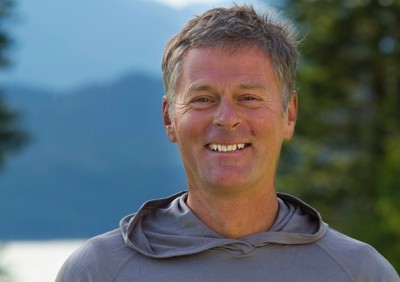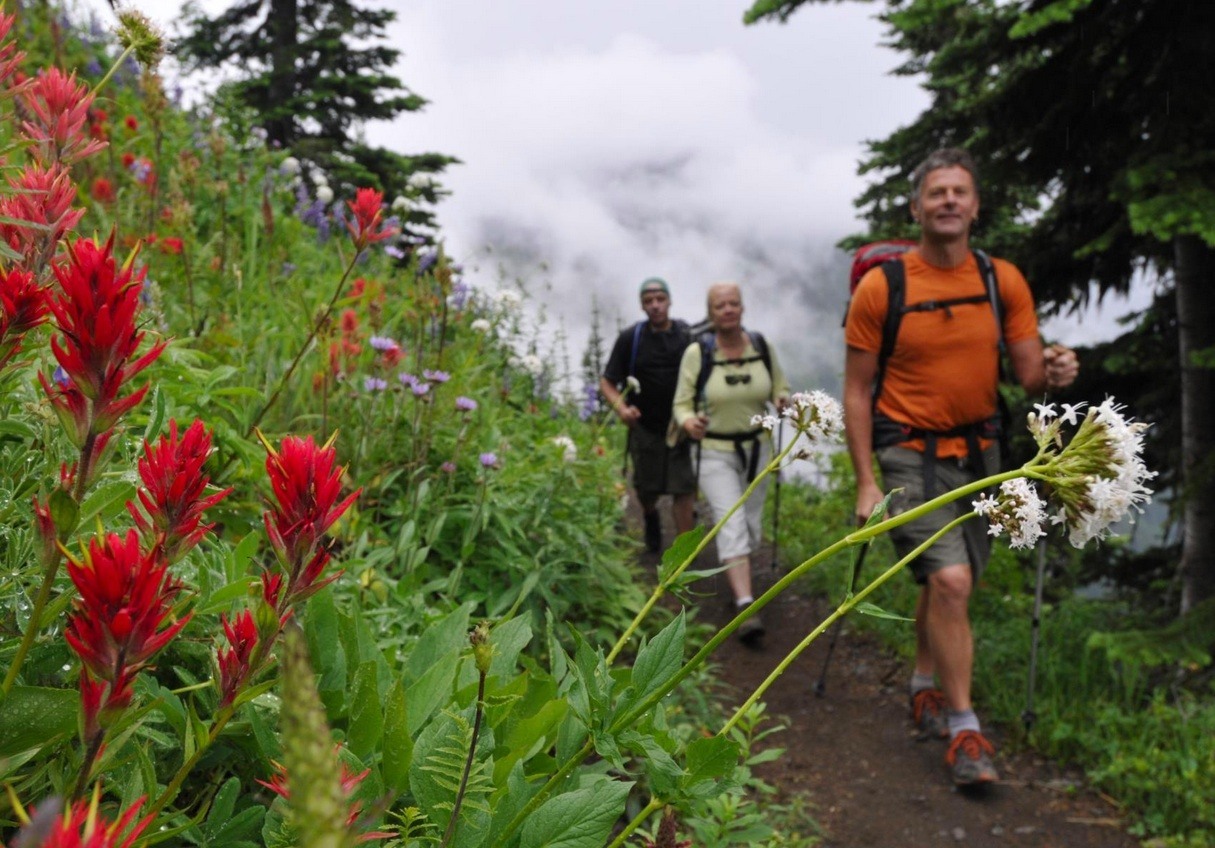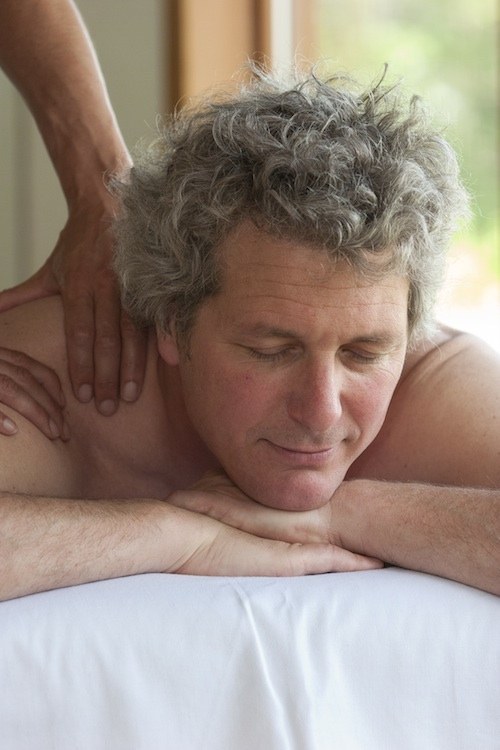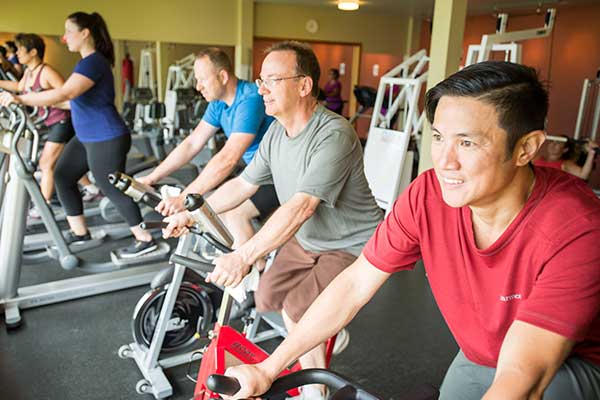Q&A with Kirkland Shave, Program Director of Mountain Trek – Part I
 In the fifth instalment of our Q&A series we veer slightly from the path and, instead of interviewing a Mountain Trek guest, we thought we’d give you a peek behind the curtain and sit down for a chat with our very own Kirkland Shave.
In the fifth instalment of our Q&A series we veer slightly from the path and, instead of interviewing a Mountain Trek guest, we thought we’d give you a peek behind the curtain and sit down for a chat with our very own Kirkland Shave.
Kirkland is a Nelson, BC, resident and has been Program Director and Manager of Mountain Trek since 2004. Not only is he a hiker extraordinaire he also plays bass guitar in his son’s band and he’s one of Mountain Trek’s most popular, poignant and engaging lecturers.
Hi Kirkland. Thanks for taking time out of your busy Mountain Trek schedule to talk with us. Let’s start with your professional and personal background and what led you to Mountain Trek?
A culmination of a variety of work and life experiences led me here. Let me back up a bit though. As a teen I started looking at alternative ways of living. I started meditating, I became a vegetarian, and I started shifting away from team sports to outdoor recreation activities. I did martial arts, yoga, and later I became a yoga instructor. I have a teaching degree and a degree in Anthropology, and for a long time I was a local British Columbia Park Ranger. Following that I started running my own wilderness and primitive skills school. Then, about 11 years ago, the original owner at Mountain Trek hired me to come out and teach these wilderness skills one day a week for a few summers. From there, because of my ranger and yoga experience, I became a hiking guide and yoga instructor at Mountain Trek.
Soon thereafter, the owner asked a dietician, kinesiologist and myself to build a weight loss program. Back around 2000 the obesity epidemic was in the news a lot so we got rid of our recreation program at Mountain Trek and started this weight loss program. But through our own knowledge base we basically turned it into a metabolism-raising program with weight loss being a by-product. It became popular very quickly and just took off from there.
Would you say that your job with Mountain Trek has been your most fulfilling one?
Absolutely because I’ve always loved nature and working outside and now I get to take people into nature… and I get to introduce people to a healthy consciousness about their body and what it means to possess emotional well-being. I’m also trained as a life coach so this is where I can focus in on what’s stressing people and how this affects their well being.
You love working with people in the outdoors, and the Mountain Trek lodge is certainly surrounded by breath-taking nature. What would you say is the profile of the average Mountain Trek guest?
They are all primarily urban, corporate North Americans. About 75% women and 25% men. The average age for a woman would be 42 and for men about 50. Men tend to be a little bit slower in paying attention to their body or health concerns, whereas women are a bit more finely attuned that way.
Are the guests already familiar with the great outdoors?
Most of them have not hiked before. I would consider them hard working professionals and traditionalists. And by traditionalist I mean they don’t regularly eat tofu, for example, or practice yoga. In fact 90% of our guests have never done yoga before. So we’re taking these professionals and opening the door, so-to-speak, so they can see other ways of living that promote more health and longevity for them…ways of living that they can weave into their lifestyle.
Does this mean that relatively fit young men and women need not go to Mountain Trek?
Not necessarily. What happens is that through sendentarism, sitting at work, commuting in a car, etc, our bodies move into a catabolic state – we become slower and suffer chronic inflammation that affects our hormones. This domino effect on all aspects of our health starts to build as we age so that people in their 40s and 50s start to feel the cumulative effects of this sedentary work life more so.
People in their 20s and 30s still have an anabolic metabolism. But even with this age group we’re noticing that the catabolic shift is happening at a younger and younger age. People come out of university and get right into a job where they tend to sit all day. We gain weight, have chronic sleep issues, less energy and vitality and on and on to worse things like type 2 diabetes, hypertension, and thyroid problems.
So, to answer your question, we could target younger people but they don’t quite see the need as acutely as someone who’s a little bit older. Nor do they typically have the money. You know, it’s a health investment and a lot of 20 or 30 year olds would rather go on a trip to Paris for a week or two…
Or Thailand…
Yeah, or Thailand.
A one or two week program at Mountain Trek is rewarding but it takes dedication. People seek out the program not only to lose weight and change their metabolism but also to kickstart an entire lifestyle makeover. That can be emotionally challenging. Do your guests ever come back, or is once enough for them?
Actually, we get a big return rate – 30% to 40% are returnees in any given week. Going back about six years though, I thought something about the program was failing. I wondered why our guests kept coming back. I had this expectation that once they came, they’ll get it and they’ll go home and they’ll change. But now I realize it’s important that people “check in” with us regularly, and get back on track. They need what I call “Mountain Trek’s magic ingredient.”
In part 2 of our Q&A with Kirkland Shave, we find out the reason for Mountain Trek’s high return rate, discover whether guests have ever left the retreat without completing the program and learn more about the retreat’s “magic ingredient.”










